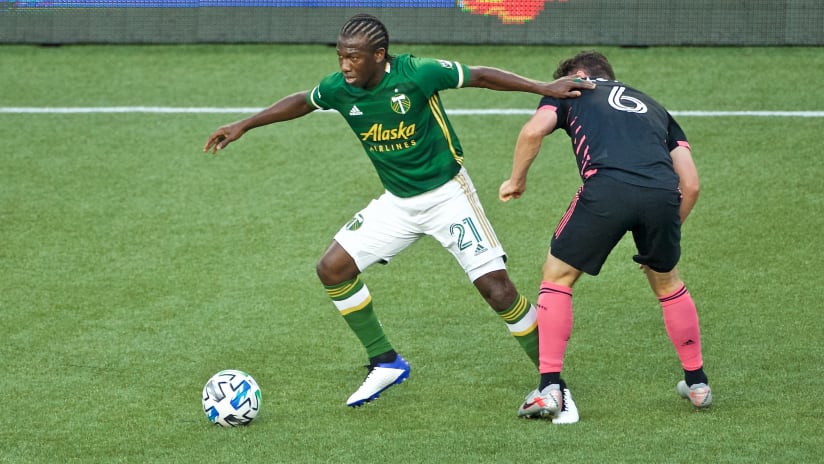Within the blunt assessments head coach Giovanni Savarese, midfielder Eryk Williamson, and forward Jeremy Ebobisse shared last Sunday night, in the wake of the Portland Timbers’ 4-2 loss at Los Angeles FC, Williamson offered the most pointed criticism. And he didn’t spare himself.
“On the field, [LAFC] kind of felt in control for those 15 minutes,” he said about the span before halftime where the Timbers gave up three goals. Williamson’s suggestion: “We just needed to get on the ball. That's where we lacked a bit of leadership from me and some of the other guys – some of the guys in midfield. We needed to step up in that moment and get control of the game.”
Usually Diego Chara is that midfield. On Sunday, he wasn’t. Shown a yellow card the previous Sunday in Seattle – his fifth yellow card of the season – Chara was suspended for the match in Los Angeles. He watched the Timbers’ loss from home.
“I think we're still working,” was the long-time Timber’s assessment, when asked about the team’s first-half lapse. “We have to be better in those critical moments, because the game against LA and against Real Salt Lake was the same situation.”
The Timbers gave up two second-half stoppage time goals to RSL on August 29, dropping points in a 4-4 draw.
“It was between 10 and 15 minutes [of time],” Chara explained about both games, “and we didn't do well. We lost the ball too many times. We have to learn from those situations for the next game.”
It gets back to what Williamson was talking about: leadership, particularly in midfield. Players in the middle of a team’s formation have the virtue of being linked to everything. It’s also a curse. Success by a team’s attackers comes with the midfield’s support. Weaknesses wide mean players in the middle allowed play to come back into dangerous areas, while breakdowns at the back hint the midfield wasn’t providing enough of a shield.
“In our position, we are really important,” Chara admits.
Are all those conclusions always right? Of course not. Not always. Perhaps even rarely, in their reduced form. But when scenes are painted of success of failure, midfielders are almost always in view.
Whether Williamson and his Sunday midfielder partner, Cristhian Paredes, were at fault for LAFC’s first-half success, the 23-year-old feels he can do more. And as somebody who has been one of the Timbers’ best players since MLS’s regular season restarted, he’s earned the right to speak up.
“We ultimately gave the game away in that kind of moment,” was his Sunday conclusion.
That one of the team’s talismans, Chara, agrees with Williamson’s premise adds some credence to the conclusion.
“I agree with Eryk a little bit,” Chara said on Tuesday, one day before the team’s next game at the San Jose Earthquakes, “because in our position … we are really important to keep the balance of the team.
“Sometimes, in some games, we lose the ball too many times, and that lets the other team control the ball and control the game. We're trying to work on that, trying to get better, making better decisions with the ball. I hope the next game, we can show that.”
It’s not like the Timbers haven’t shown that control before. They did so in Orlando, during July and August at the MLS is Back Tournament. If that reference is getting too old (or, too played out), the team also showed “that” as recently as 10 days ago, during a 2-1 victory at Seattle Sounders FC.
In that sense, inconsistency may be a bigger problem than capability – to the extent those things can be separated. When asked if that inconsistency is seeding frustration, Savarese said, on Tuesday, “We've got to be careful when we talk about frustration.
“I think both [the Seattle and LAFC] performances were very strong,” he said. “Just one was complete, and the other one had 12 minutes, 15 minutes that unfortunately we have to make sure don't happen again.
“We need to now stay calm and be able to work, because there is a lot of good that we saw in [Los Angeles]. And we can not get frustrated. How we're going to deal going forward is the most important part for us in order to be able to move forward.”
Think about Savarese’s options; then think about the team’s big-picture goals. Like every other team in Major League Soccer, Portland wants to be at its best when the games count most: in the postseason, something that is still (in theory) almost two months away. Before that, teams want to compete for the Supporters’ Shield and finish as high in the standings as possible, but aside from actually qualifying for the playoffs, the most important thing is the process. It’s the building of your team. It’s where you show improvement.
Map that attitude onto this moment. If a team confronted their regular-season challenges with postseason intensity, they might have to maintain that level through the end of the season. They’d have found their way to solve problems. That would be their solution.
Mentally, that’s probably not sustainable, which is why some coaches choose a more measured approach. They bet on their players’ maturity. They want them to buy into a process, trust in each other’s work, and maintain faith that process will pay off.
“If we do that,” Savarese said, “we're going to get more points than not.”
At some point, the Timbers need to start showing that pay off. After Seattle, it looked like that payoff had come. Now, with two games against San Jose on the horizon, the team needs to get back on course.
“We know that it is really important to get three points,” Chara said, later adding, “I think that everyone is ready for the next game.”













